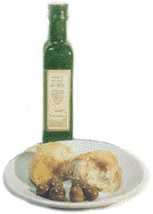...Best of Sicily presents... Best of Sicily Magazine. ... Dedicated to Sicilian art, culture, history, people, places and all things Sicilian. |
by Roberta Gangi | |||
Magazine Index Best of Sicily Arts & Culture Fashion Food & Wine History & Society About Us Travel Faqs Contact Map of Sicily
|
With that said, which Sicilian olive oil was judged the the best for 2008? We maintain, for the reasons cited in the article reporting our April 2006 tasting, that most Sicilian olive oils are unexceptional, but we found ten that were, and they formed the basis of this year's comparison. Our tasting featured "estate-bottled" Sicilian extra-virgin olive oils produced in limited quantities by smaller firms using the olives harvested from a single place (usually their own farms). As a "control," we included the "better" brands of two "cooperatives" which market the oils of numerous producers as a single product. This was a blind tasting; nobody knew the brand of oil they were sampling, and no producers or marketing representatives were present. This was not a commercial or promotional exercise, merely a culinary one, and none of the six tasters --all experienced in preparing Mediterranean cuisine-- are associated with any olive oil vendor. While most of the oils tasted are organic, we did not make that a requirement for consideration. In first place was Tenuta Baronale, made by a small firm at the other end of Sicily in the Nebrodi and Madonie mountains. Their unfiltered oil is a "quasi-varietal" based on the Nocellara (75%) and Verdello (25%) olives. It is actually organic, though not formally certified as such. In Italy an oil is recognised as organic if made from olives harvested from trees that have not been treated with chemicals of any kind for at least two years. The oil was extremely fresh-tasting, having the flavour of crushed olives, but the Verdello olives --a large green variety often used in salads-- gave it some sharp top notes. This is a very dense oil; some of our tasters found the foggy texture and the sediment appealing. Tenuta Baronale came in third in our 2006 tasting. In second place this year was Titone, our 2006 winner. The vintage Titone (we opened a bottle from the 2007 season) is an organic, minimally-filtered oil made from three varieties of olive (50% Nocellara, 25% Biancolilla, 25% Cerasuola) produced by a family-run firm near Marsala. The oil in third place was Sant'Andrea, an organic produced in Petralia Sottana in the southern Madonie region from four olive varieties. Of course, the best test is tasting the oil yourself, by itself, dipped in fresh white bread. Oil making is an art practiced in Sicily for around three thousand years. REALITY CHECK: Many of the best known "Italian" olive oils, even those classified "extra-virgin," are actually produced from olives imported from Spain, Greece, Turkey and Tunisia. (For that matter, very little "Italian" pasta is produced from wheat grown here in Italy.) In fact, much of the "Sicilian" olive oil sold in the export market is not made from locally-grown olives but under European Union law there's little accountability for the precise origin of the product. In some cases the olives are pressed abroad (outside Italy) and the oil is imported into Italy for bottling as "Mediterranean" oil with little regard for precise extraction standards (cold pressing versus refining) or quality. Much is "lampante," i.e. pressed from dried, dirty olives found on the ground rather than harvested from the trees, and from which oil is extracted --in the case of Spain and Tunisia-- using talc. There are no import controls for oil which arrives in Italy from other EU countries. A controversial 1995 law permits much lampante oil to be sold as extra virgin. The scandal is too complicated to explain in detail here. Caveat emptor! About the Author: Roberta Gangi has written numerous articles and one book dealing with Italian cultural and culinary history, and numerous food and wine articles for Best of Sicily Magazine. | ||
Top of Page |
 Two years ago we published the results of our
Two years ago we published the results of our